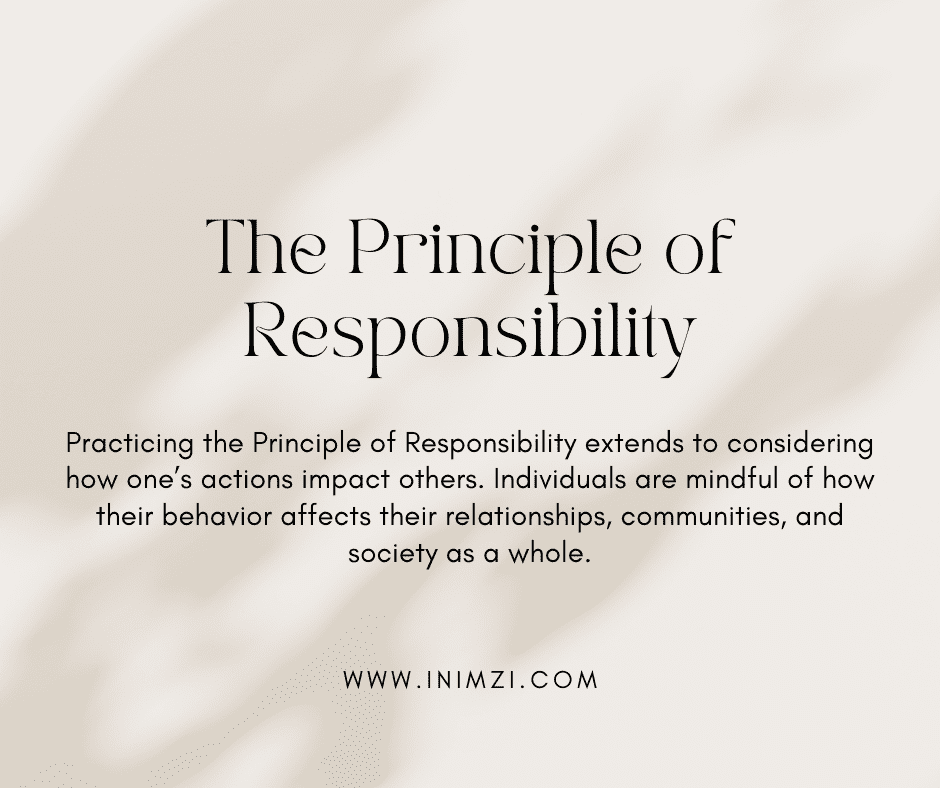Self-Accountability:
The Principle of Responsibility emphasizes self-accountability. It encourages individuals to take ownership of their actions, decisions, and the consequences that result from them.
Ethical Decision-Making:
Individuals who adhere to the Principle of Responsibility make ethical decisions. They consider the moral and social implications of their choices, striving to act in ways that align with values such as honesty, fairness, and integrity.
Cause and Effect:
This principle acknowledges the principle of cause and effect. It emphasizes that every action has consequences, and individuals are responsible for both the intended and unintended outcomes of their choices.
Reflection and Self-Examination:
Practitioners of the Principle of Responsibility engage in self-reflection and self-examination. They regularly assess their motivations, beliefs, and behaviors to ensure they are in alignment with their values and principles.
Learning from Mistakes:
Accepting responsibility includes acknowledging mistakes and learning from them. Those who follow this principle view mistakes as opportunities for growth and strive to avoid repeating them.
Empowerment and Control:
Taking responsibility empowers individuals to have a sense of control over their lives. It promotes the idea that while external circumstances may be beyond one’s control, personal choices and responses are not.
Impact on Others:
Practicing the Principle of Responsibility extends to considering how one’s actions impact others. Individuals are mindful of how their behavior affects their relationships, communities, and society as a whole.
Transparency and Integrity:
Transparency and integrity are valued by those who follow this principle. They believe in being honest and authentic in their interactions and decisions, even when facing challenges or difficult situations.
Conscious Decision-Making:
Individuals who embrace the Principle of Responsibility make conscious decisions. They do not act impulsively but rather take the time to consider the potential consequences of their choices.
Responsibility to Self:
This principle emphasizes that individuals have a responsibility to themselves. This includes self-care, self-improvement, and taking steps to fulfill one’s potential.
Responsibility to Society:
Practitioners recognize their responsibility to society and the broader world. They may engage in acts of service, advocacy, or activism to contribute to positive change.
Emotional Responsibility:
Emotional intelligence is important within this principle. It involves taking responsibility for one’s emotions, understanding their origins, and choosing healthy ways to express and manage them.
Environmental Stewardship:
Taking responsibility extends to the environment. Individuals who embrace this principle may adopt eco-friendly practices and advocate for sustainable living to minimize harm to the planet.
Lifelong Learning:
Responsibility includes a commitment to lifelong learning and personal development. It involves seeking knowledge and skills that enhance one’s ability to make informed choices.
Self-Reflection Tools:
Some individuals use tools like journaling, meditation, or therapy to aid in self-reflection and responsibility-taking. These practices facilitate deeper self-awareness.
Balancing Freedom and Responsibility:
The Principle of Responsibility recognizes the balance between personal freedom and responsibility to others. Practitioners aim to find this equilibrium in their choices and actions.
Leading by Example:
Those who embody this principle often lead by example. They inspire others through their responsible and ethical behavior, encouraging a culture of accountability.
